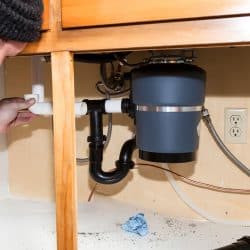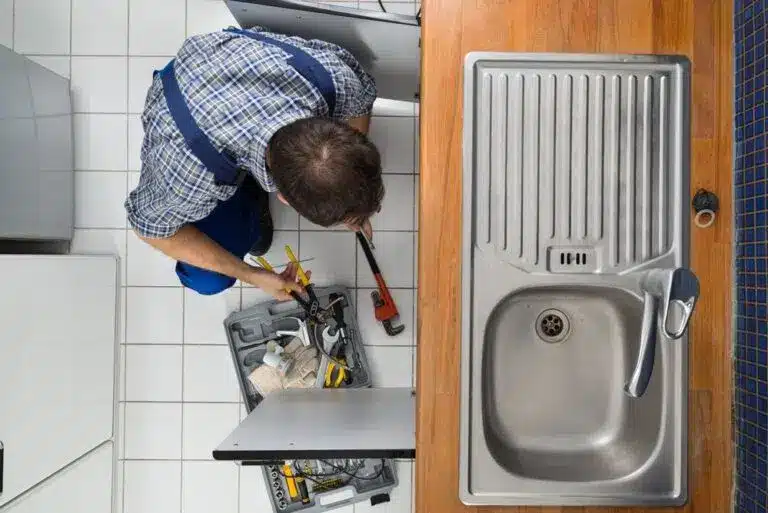Simple Techniques for Repairing a Leaky Garbage Disposal
Simple Techniques for Repairing a Leaky Garbage Disposal
Blog Article
The writer is making several good observations about Why Is My Garbage Disposal Leaking From the Bottom? in general in the content down below.

Waste disposal unit are crucial cooking area devices that assist in getting rid of food waste efficiently. However, a dripping waste disposal unit can be an aggravating and messy trouble to take care of. Thankfully, many leakages can be repaired quickly with a couple of basic actions. In this post, we will go over how to take care of a leaking garbage disposal properly.
Intro
Garbage disposals are set up under cooking area sinks and are developed to shred food waste right into smaller sized pieces, allowing it to go through the pipes system easily. While these tools are usually trustworthy, leaks can happen gradually as a result of deterioration, loosened links, or damage to the system.
Step-by-Step Overview to Fixing a Leaking Garbage Disposal
Shut off the Power
Prior to trying any repairs, guarantee that the power to the waste disposal unit system is switched off to avoid the threat of electrical shock.
Find the Leak
Determine the specific area of the leakage and establish the reason
Tighten Connections
Use a wrench to tighten up any kind of loosened connections in between the disposal device and the pipes system.
Replace Seals or Gaskets
If the leakage is because of worn seals or gaskets, get rid of the old elements and change them with new ones.
Patching Splits or Holes
For fractures or openings in the disposal unit, usage epoxy or a suitable patching product to secure the damaged area.
Recognizing the Resource of the Leak
Before trying to fix a leaking garbage disposal, it is important to recognize the source of the leak. This can normally be done via aesthetic inspection or by conducting easy tests.
Visual Inspection
Examine the garbage disposal unit thoroughly for any type of signs of water leakage. Pay close attention to locations around seals, gaskets, and link points.
Testing for Leakages
One means to test for leakages is by running water via the disposal unit and checking for any kind of noticeable indicators of leakage.
Common Causes of Leakages in Rubbish Disposals
Worn Seals and Gaskets
Seals and gaskets play a crucial duty in preventing water from leaking out of the garbage disposal. In time, these components can wear away, causing leakages around the disposal device.
Loose Connections
The links between the waste disposal unit and the pipes system can become loose with time, triggering water to leak out during operation.
Fractures or Openings in the Disposal System
Physical damages to the garbage disposal, such as cracks or openings in the real estate, can additionally cause leaks.
Tools and Products Needed for Repairing a Dripping Waste Disposal Unit
Prior to starting the repair process, gather the needed devices and materials, including a screwdriver, adjustable wrench, plumbing's putty, replacement seals or gaskets, and epoxy or patching material for repairing splits or openings.
Checking the Garbage Disposal After Fixing
When the repair work is complete, examine the waste disposal unit by running water through it to ensure that the leakage has been resolved.
Preventive Upkeep Tips to Avoid Future Leaks
To stop future leaks, it is essential to do regular upkeep on your waste disposal unit. This includes maintaining it tidy, staying clear of placing non-food things or difficult things down the disposal, and regularly looking for leaks or other concerns.
Conclusion
Finally, fixing a leaking waste disposal unit is a relatively straightforward process that can be finished with standard tools and materials. By adhering to the steps described in this post and exercising precautionary upkeep, you can maintain your waste disposal unit in good working problem and prevent expensive repair services in the future.
HERE’S HOW TO FIX YOUR GARBAGE DISPOSAL
WHAT TO DO IF SOMETHING IS STUCK IN YOUR GARBAGE DISPOSAL
If the impeller won’t turn, there’s probably something stuck in the disposal. It could be a steak bone or peach pit, although plumbers report pulling all sorts of inappropriate objects out of disposals, such as bottle caps or aluminum foil. Make sure power to the disposal is off, and look inside to see if you can see the source of the jam.
Never stick your fingers in a disposal. Pull out anything you see with tongs or pliers.
If the disposal still won’t work, it may be time to call a plumber or consider buying a new disposal. GEM Plumbing & Heating is here for all of your garbage disposal needs.
WHAT TO DO IF YOUR GARBAGE DISPOSAL DRAIN IS CLOGGED
Take everything out from underneath your sink and put a bucket or other container under your disposal to catch any water that drains out. Disconnect your disposal from the power supply. If it’s plugged into a wall outlet, unplug it. If it’s hardwired into an electrical box, go to the electrical panel and turn off the breaker for the disposal. Pour ¼ cup of baking soda into the drain, followed by ½ cup of white vinegar. Give the solution a few minutes to fizz and do its work. Look into the disposal with a flashlight to see if you can see an object that might be causing the clog. If you see it, remove it using tongs or pliers. MORE TIPS ON DEALING WITH A CLOGGED GARBAGE DISPOSAL
Never use drain cleaner in a garbage disposal. It can damage the plastic parts inside the disposal. You can also be splashed with the caustic liquid while working to clear the clog. Beware! Never stick your fingers into a garbage disposal. Trust us — not a good idea. In many instances, your dishwasher drains through your garbage disposal. This allows the disposal to grind any large food particles that may be drained out of your dishwasher. There are some jurisdictions, however, where the plumbing code prohibits such a connection. WHAT TO DO WHEN YOUR DISHWASHER DRAINS THROUGH THE DISPOSAL
Run some water in the sink so your plunger has at least a ½-inch of water to create a seal and plunge vigorously up and down several times. You may need to repeat this several times. Run hot water down the drain to clear any residue that remains.

We are very serious about Why Is and I really hope you liked the new article. Do you know someone else who is intrigued by the niche? Take a moment to promote it. Thanks a lot for taking the time to read it.
Visit Page Report this page